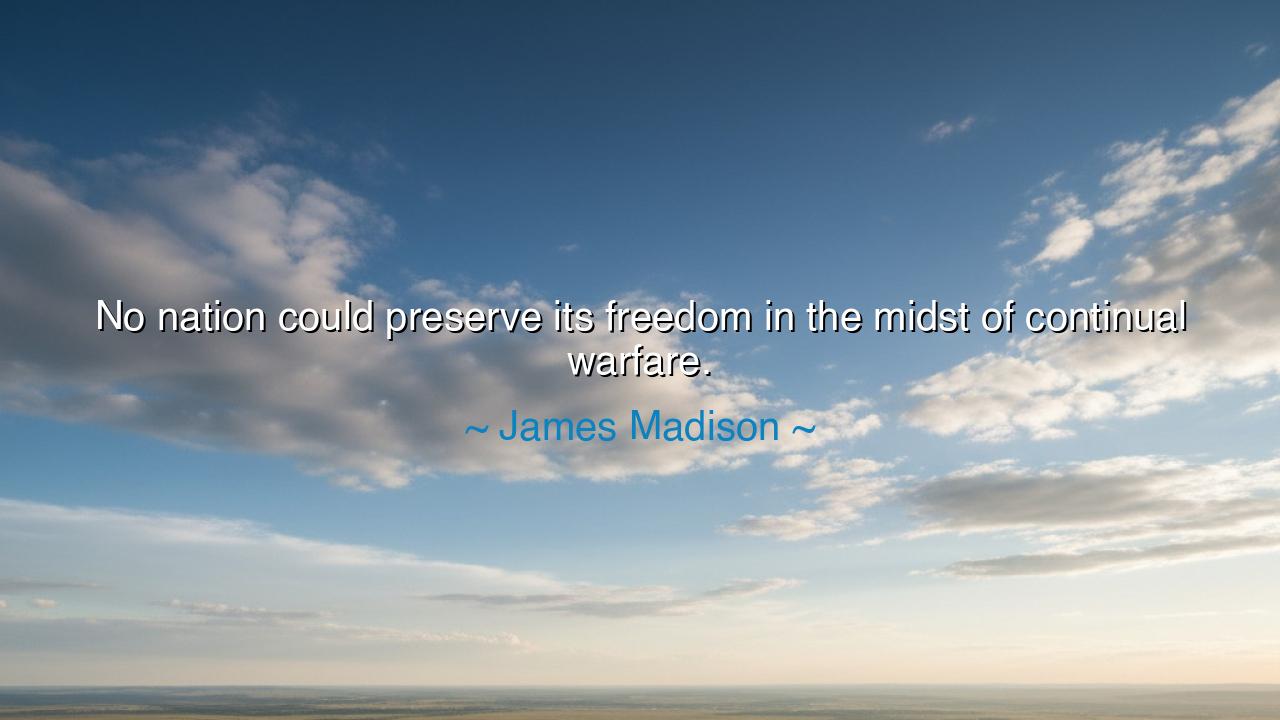
No nation could preserve its freedom in the midst of continual






Host: The room was quiet, the soft light of the evening spilling across the floor, casting long, gentle shadows. Outside, the world was slowly fading into night, but inside, there was a stillness that seemed to carry weight. Jeeny sat at the edge of the couch, a notebook in her hands, but her focus seemed far away. Jack, standing by the window, gazed out into the gathering darkness, his mind clearly lost in thought.
After a long moment of silence, Jeeny spoke, her voice thoughtful, yet carrying an undercurrent of something deeper.
Jeeny: “I came across something today by James Madison. He said, ‘No nation could preserve its freedom in the midst of continual warfare.’ What do you think about that?”
Jack: (pauses, his expression serious) “It makes sense, right? If a country is always at war, how can it maintain the freedoms it’s supposed to protect? War takes a toll, not just on the people who fight, but on the very foundations of what a nation is built on. The constant state of conflict erodes the ability to be free—to live without fear or oppression.”
Jeeny: (nodding slowly, her voice quiet but firm) “Exactly. War demands so much from a nation—resources, energy, lives—that it becomes hard to maintain the ideals of freedom when everything is consumed by conflict. There’s a cost, not just in lives lost, but in the erosion of the values that made the country free in the first place.”
Host: The conversation hung in the air, the words of Madison carrying a quiet weight, settling between them like an undeniable truth. The evening outside had deepened, and inside, the quiet was punctuated only by their words, each one resonating with the recognition that war and freedom couldn’t coexist indefinitely. Jeeny and Jack sat in that realization, the silence between them thick with understanding.
Jack: (his voice softer now, more reflective) “It’s hard to imagine a country staying true to its values when it’s always focused on fighting. The demands of war change the nature of government, the nature of society. You can’t have a free, open nation when everything is about survival.”
Jeeny: (with a thoughtful smile) “Right. It’s not just the cost of war that wears a nation down. It’s the way it shapes the way we live. Constant war breeds fear, suspicion, and sometimes even authoritarianism. A nation that’s constantly at war starts to prioritize security over liberty. And eventually, freedom slips away, replaced by the weight of the conflict.”
Jack: (pauses, looking out the window, his voice quiet) “I guess that’s why war is so dangerous. It’s not just about the immediate impact. It’s about what it does to the core of a society. What happens to a nation’s freedom when all it knows is war?”
Jeeny: (gently) “That’s exactly what Madison was warning against. Freedom can’t thrive in a state of perpetual conflict. A nation needs peace to grow, to evolve, and to truly be free. Without that peace, freedom becomes a casualty of war itself.”
Host: The room was still, the soft light now casting shadows over the quiet figures in the room. The weight of Madison’s words had settled deep within them, the conversation feeling heavier, yet full of clarity. The world outside had turned to night, but inside, there was an understanding that war, no matter its justification, ultimately corrodes the very thing it seeks to protect—freedom. Jeeny and Jack sat together, the idea settling between them like an unspoken truth.
Jack: (after a pause, softly) “I think Madison’s right. A nation can’t preserve its freedom if it’s always fighting. You can’t have both—the cost of war on the soul of a nation is too high.”
Jeeny: (nodding quietly) “And it’s not just about the war—it’s about the peace we build afterward, the kind of world we want to live in once the fighting stops. True freedom is about living without the constant threat of violence, about building a future where war is no longer the dominant force in our lives.”
Host: The night had fully taken hold, and the world outside seemed to fade into the background. But inside, Jeeny and Jack sat in the quiet realization that the cost of war goes beyond the battlefield. It impacts everything—the values we hold dear, the freedom we cherish, and the very nature of what it means to live in a peaceful society. And while the world outside may continue its endless cycle, here, in this moment, they had found a shared understanding of the weight of Madison’s warning: no nation can preserve its freedom when war is the constant backdrop.






AAdministratorAdministrator
Welcome, honored guests. Please leave a comment, we will respond soon